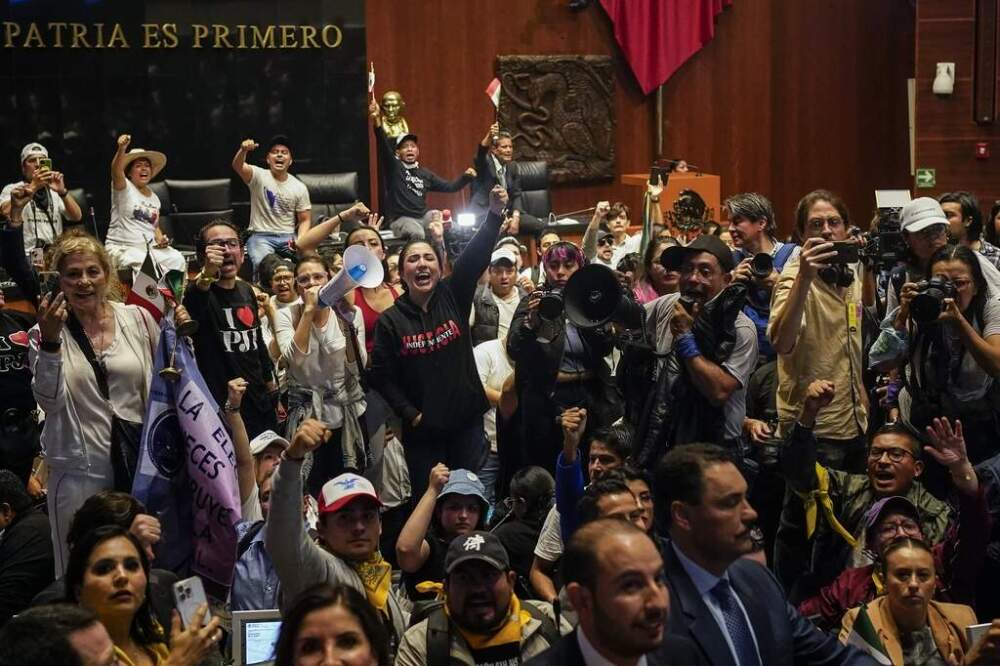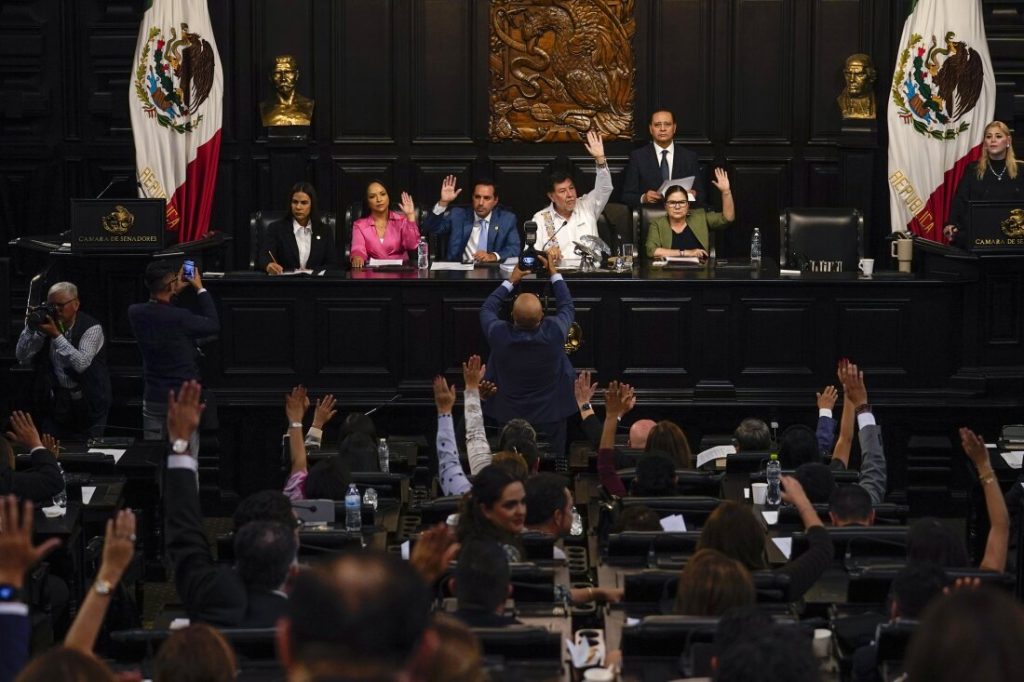Judicial independence has been often sighted as a reason we have presidentially appointed judges and magistrates hired without public participation. Over the years, we have seen that the judiciary is not independent but leans in favour of the executive that recruits it. In the same period, we have witnessed the judiciary becoming extremely corrupt, abandoning its role as a bulwark against the excesses of both the executive and the legislature.
Political appointments have realigned the judiciary with the executive’s parochial interests, which the Parliament articulates well. New rulers in Mexico, elected with a supermajority, have promised judicial overhaul as necessary to clip the wings of corruption and judicial excesses.
Critics say the envisaged reforms will lead to political decisions instead of judicial ones. This discourse appraises both sides’ pros and cons and draws my conclusions.
The Mexican judicial reforms that both congressional houses have ratified will be closely watched worldwide to see whether the intended reforms will root out corruption and nepotism or worsen them. Judicial activists and judiciary members stormed the Mexican Senate to express their displeasure.
READ RELATED: Scandal and Corruption: How Tanzania’s Judiciary Is Hijacked by Political Elites
The Mexican Senate voted 86 to 41 in favour of the bill. More than 50,000 Court workers, including federal judges and Supreme Court justices, have been on strike to protest the proposed overhaul!
Both warring sides claim judicial independence is at stake. Curiously, it is how to achieve it that has polarized the country. In the current setup, the judiciary polices itself by ratifying executive and congressional hearings.
The protesters aver that there are enough checks and balances to ensure judicial independence is not compromised. Still, to the reformers, those safeguards are too weak to thwart corruption and nepotism.
It is opaque; judicial recruitment is done without public participation, just like in Tanzania. Over time, senior judges and politicians become gatekeepers screening who should join the judiciary and who should not. Nepotism is the biggest beneficiary, and meritocracy is the chief casualty.
Suppose one can map out how recruitment is done. In that case, one will see that the individual has to invoke ethnicity, religion, or favouritism, whether financial or sexual, to attract the attention of employers.

The general public hears that judiciary members have been hired, but despite being the wearer of the shoes and knowing where it pinches, they are not involved in the recruitment process! The public knows the venal judicial officers, but the recruitment system does not give them room to express their views.
In Tanzania, even their representatives in Parliament are not involved in hiring decisions! The lack of interactive dialogue between the public and judicial recruiters contributes to the metastasis of corruption. Judicial officers face almost zero consequences if they extort bribes and receive them. Since ‘TAKUKURU‘ was formed, it has never indicted senior judiciary members of corruption, indicating how rotten the whole system is.
The secret manner in which judiciary members are hired fails to inject legal qualities. Non-performance criteria are being deployed to placate those who support the regime in power. Since legal quality is not part of the recruitment criteria, it is a small surprise that the public has lost faith in the judiciary.
Litigants go to court not because they expect justice, but they still march there for a chimaera: maybe a God-fearing magistrate or judge will be assigned their case. It is like playing poker game where you lose more than you gain.
ALSO READ A Lawyer’s Perspective: Justice into the Ground! Is the Legal System and Lawyers Failing Tanzanians?
Judicial reforms in Mexico have been resisted, and I can easily see similar arguments perpetuated in Tanzania based on the assurance of foreign investors. But this does not hold in Tanzania, where international agreements preclude domestication of litigation, as elaborate provisions have been imprinted to ensure international arbitrators have the final say on how Tanzanian wealth should be managed!
At one time, a local investor cum politician accused the executive of meddling in commercial cases. He alleged it took a senior politician to call a judge presiding a case for the judge to capitulate!
The business mogul explained why international agreements have expunged domestic courts from deciding disputes arising from international agreements. Thus, the argument of retaining the judicial status quo holds no water, as courts cannot even be trusted to adjudicate disputes culminating from international agreements.
No sooner did local judicial activists hear the judiciary was compromised in one accord, demanding the tycoon retract his allegations, or he would be taken to court.
I have always asked myself whether the courts can hear a libel case against themselves and whether that will not be a judge of their own cause and pinching free speech, all bundled in one box. I think the threats of litigation were highly misconceived. The tycoon succumbed, possibly not to sever his links with the political class that he largely depended on to patch up his business empire.
Another reason is the time lapse in deciding cases. A case lodged today in Tanzanian courts may take an average of twenty years to resolve! Justice delayed is justice denied, which is very applicable to Tanzanian courts. Litigants die or are forced to lose interest because they cannot afford to be perpetually taken on conveyor belts.
Courts are obsessed with technicalities, not legal and factual disputes. The way an affidavit is drafted assumes importance more than the case itself. Moving a court with statutes is more important than a dispute itself. However, litigants feel cheated and forsaken when matters that bring them to courts are not given a hearing, but courts conjure up issues that suit their narratives to strike out cases!
Even when the Parliament has crafted laws that require the judiciary to prioritize the interest of justice, courts have found a comical way to circumvent that by defining preliminary issues as substantive while they are not.
Without public participation in the recruitment and promotion of judiciary members, the courts will never meet society’s expectations. Still, they will continue pandering to the executive whims of those with the final say in their careers. In that see-saw of judicial scales, the public is the major loser.
There are many options for adding public participation to the mix. The Kenyan example is the Judiciary Commission, which seeks public input by advertising the available vacancies.
Public participation is also assured when those who nurse grievances against the interviewees deposit their complaints in the form of affidavits, and the complainants and the applicants meet face to face. The element of judicial accountability is well removed there.
Once the judiciary commission has shortlisted the applicants, it forwards the names of potential employees to the president, who appoints the recruits subject to parliamentary oversight that too vigorously solicits public input. The Kenyan judicial system is not without its weaknesses.
During President Uhuru Kenyatta’s reign, he refused to appoint a proposed list of judges, accusing them of corruption. His critics said he could not eat his cake and claim he still had it.
They groaned that it was irregular for the president to grandstand and appoint the recommendations of the judiciary commission based on graft allegations. At the same time, he had interdiction, investigation, and dismissal powers at his disposal. He should have exercised them and granted his accused the benefit of the doubt.
The judges had to wait months before Kenyatta’s successor, President William Samuoi Ruto, appointed all of them no sooner than he was sworn in. Curiously, President Ruto has regularly accused the judiciary of victimising his government in various cases. Corruption and political alignments have been cited as reasons the Kenyan judiciary was not independent.
We should never forget that politicians are our representatives. Our chequered history has shown that politicians have failed us, causing us irreparable damage. Hence, the Mexican experiment may be a worthwhile effort. If we can elect politicians, we can elect judicial officers of all cadres. The advantages are many.
All qualified Tanzanians will have a credible shot at being hired there without being burdened by nepotism. Second, judicial independence must be checked by public accountability.
Our problem of judicial independence had been doled out without sufficient public accountability, and direct elections will transform the relationship between the judiciary, the public, and our self-seeking politicians. The judiciary will know that failing to meet public expectations will seriously impact their careers.
Wait a moment and take a deep breath. As pleasant as it is, this theory will face one killer assumption: the elections must be free, fair, and verifiable.
Our elitists are unwilling to permit such a political battle without a violent fight. Unless the elections are free, fair, and verifiable, such reforms may still ratify the existential judicial rot, to our collective dismay and shock!
Reforms genuinely intend to solve problems but end up stewing up new ones because organizations resist changes for fear of not knowing who the winners and losers are.

